Adams J.T. Empire on the Seven Seas. The British Empire 1784-1939
Подождите немного. Документ загружается.

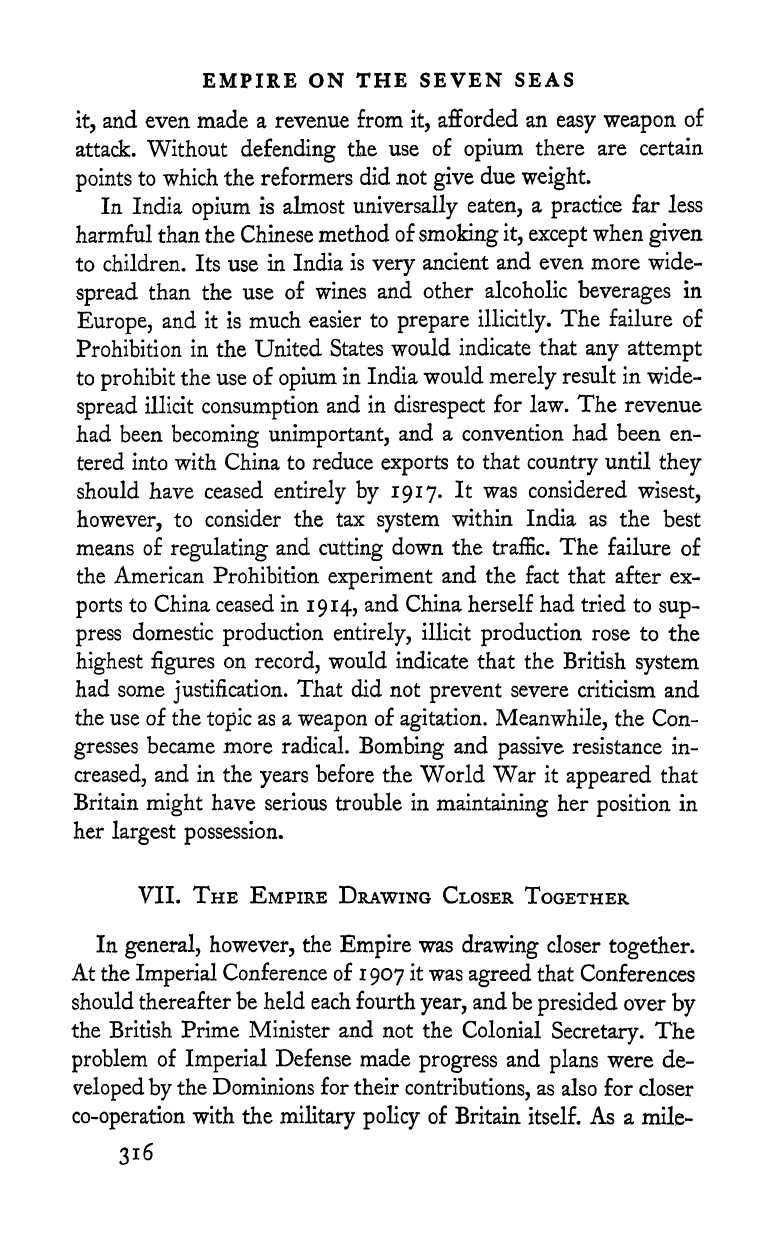
EMPIRE
ON THE
SEVEN
SEAS
it,
and even
made
a revenue
from
it,
afforded an
easy
weapon
of
attack.
Without
defending
the
use
of
opium
there
are
certain
points
to
which
the reformers
did
not
give
due
weight.
In India
opium
is
almost
universally
eaten,
a
practice
far
less
harmful than the
Chinese
method
of
smoking
it,
except
when
given
to children.
Its use
in
India
is
very
ancient
and
even
more
wide-
spread
than
the
use
of
wines
and
other
alcoholic
beverages
in
Europe,
and
it is
much
easier
to
prepare
illicitly.
The
failure
of
Prohibition
in
the United
States would
indicate
that
any
attempt
to
prohibit
the
use
of
opium
in India
would
merely
result
in wide-
spread
illicit
consumption
and in
disrespect
for
law. The
revenue
had
been
becoming unimportant,
and
a
convention
had been en-
tered into
with China to
reduce
exports
to that
country
until
they
should
have
ceased
entirely by
1917.
It
was considered
wisest,
however,
to
consider the
tax
system
within India as
the
best
means of
regulating
and
cutting
down
the traffic. The
failure
of
the American
Prohibition
experiment
and
the
fact
that
after ex-
ports
to
China
ceased
in
1914,
and
China
herself
had
tried
to
sup-
press
domestic
production
entirely,
illicit
production
rose
to
the
highest
figures
on
record,
would
indicate that
the
British
system
had
some
justification.
That
did
not
prevent
severe
criticism
and
the
use
of the
topic
as
a
weapon
of
agitation.
Meanwhile,
the
Con-
gresses
became more radical.
Bombing
and
passive
resistance
in-
creased,
and
in the
years
before the World War
it
appeared
that
Britain
might
have serious
trouble
in
maintaining
her
position
in
her
largest possession.
VII. THE
EMPIRE DRAWING
CLOSER
TOGETHER
In
general,
however,
the
Empire
was
drawing
closer
together.
At the
Imperial
Conference of
1907
it
was
agreed
that
Conferences
should
thereafter be
held
each fourth
year,
and
be
presided
over
by
the British
Prime
Minister
and
not
the
Colonial
Secretary.
The
problem
of
Imperial
Defense made
progress
and
plans
were
de-
veloped
by
the
Dominions
for their
contributions,
as
also for
closer
co-operation
with
the
military policy
of Britain
itself. As
a
mile-
316
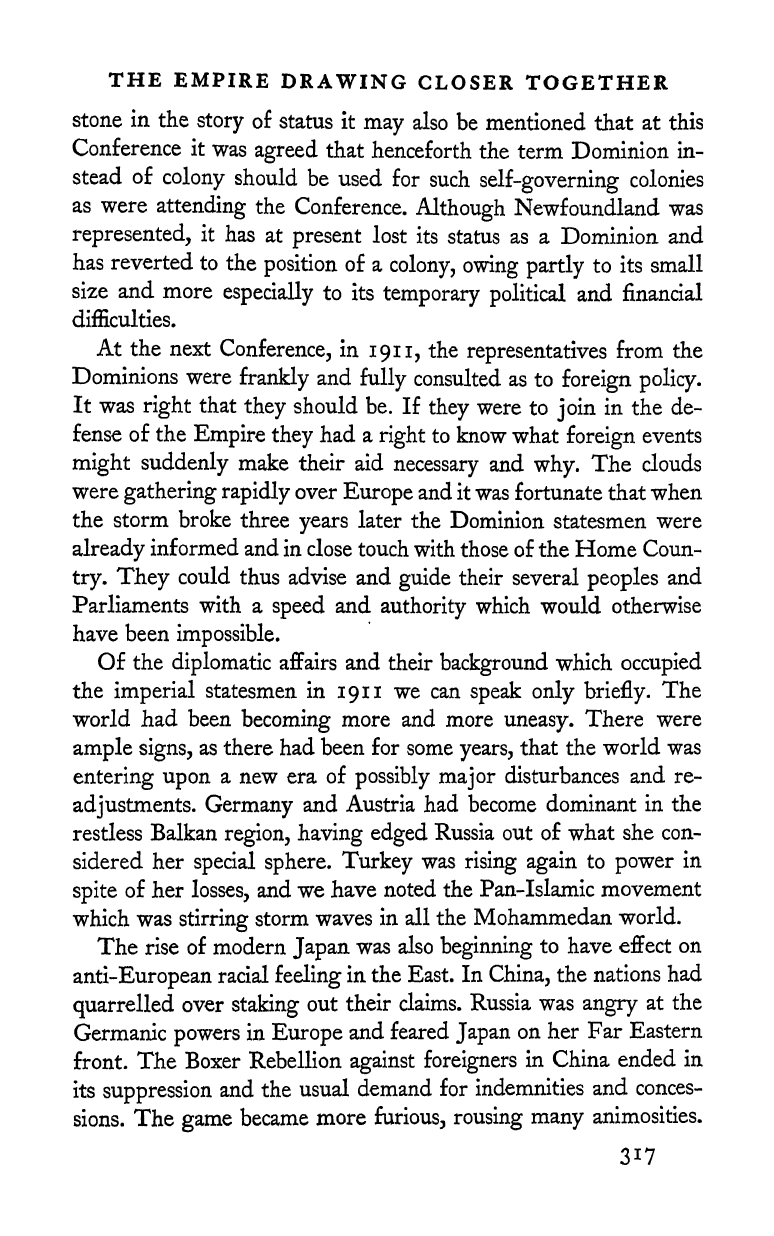
THE
EMPIRE
DRAWING
CLOSER
TOGETHER
stone
in
the
story
of
status
it
may
also
be
mentioned that
at this
Conference it
was
agreed
that
henceforth
the
term
Dominion
in-
stead
of
colony
should
be used
for
such
self-governing
colonies
as
were
attending
the
Conference.
Although
Newfoundland
was
represented,
it
has
at
present
lost
its
status
as a
Dominion
and
has
reverted
to
the
position
of
a
colony,
owing
partly
to its
small
size
and
more
especially
to
its
temporary
political
and
financial
difficulties.
At the next
Conference,
in
1911,
the
representatives
from the
Dominions were
frankly
and
fully
consulted as
to
foreign policy.
It was
right
that
they
should be.
If
they
were
to
join
in
the
de-
fense
of
the
Empire
they
had a
right
to
know
what
foreign
events
might
suddenly
make
their
aid
necessary
and
why.
The
clouds
were
gathering
rapidly
over
Europe
and
it was
fortunate
that when
the
storm
broke three
years
later
the
Dominion
statesmen
were
already
informed
and
in close
touch with
those of
the
Home
Coun-
try. They
could
thus
advise and
guide
their
several
peoples
and
Parliaments with
a
speed
and
authority
which
would
otherwise
have
been
impossible.
Of
the
diplomatic
affairs and
their
background
which
occupied
the
imperial
statesmen
in
1911
we can
speak
only
briefly.
The
world had
been
becoming
more
and
more
uneasy.
There were
ample
signs,
as
there had been
for
some
years,
that
the
world was
entering upon
a
new
era
of
possibly
major
disturbances
and
re-
adjustments.
Germany
and Austria
had
become
dominant
in
the
restless
Balkan
region,
having
edged
Russia
out
of
what
she
con-
sidered
her
special
sphere. Turkey
was
rising
again
to
power
in
spite
of
her
losses,
and we
have
noted
the
Pan-Islamic
movement
which was
stirring
storm
waves
in all the
Mohammedan
world.
The
rise of modern
Japan
was also
beginning
to
have
effect
on
anti-European
racial
feeling
in
the East.
In
China,
the
nations
had
quarrelled
over
staking
out
their claims.
Russia
was
angry
at
the
Germanic
powers
in
Europe
and
feared
Japan
on her
Far Eastern
front.
The
Boxer Rebellion
against
foreigners
in
China
ended
in
its
suppression
and the
usual
demand for
indemnities
and
conces-
sions.
The
game
became
more
furious,
rousing
many
animosities.
317
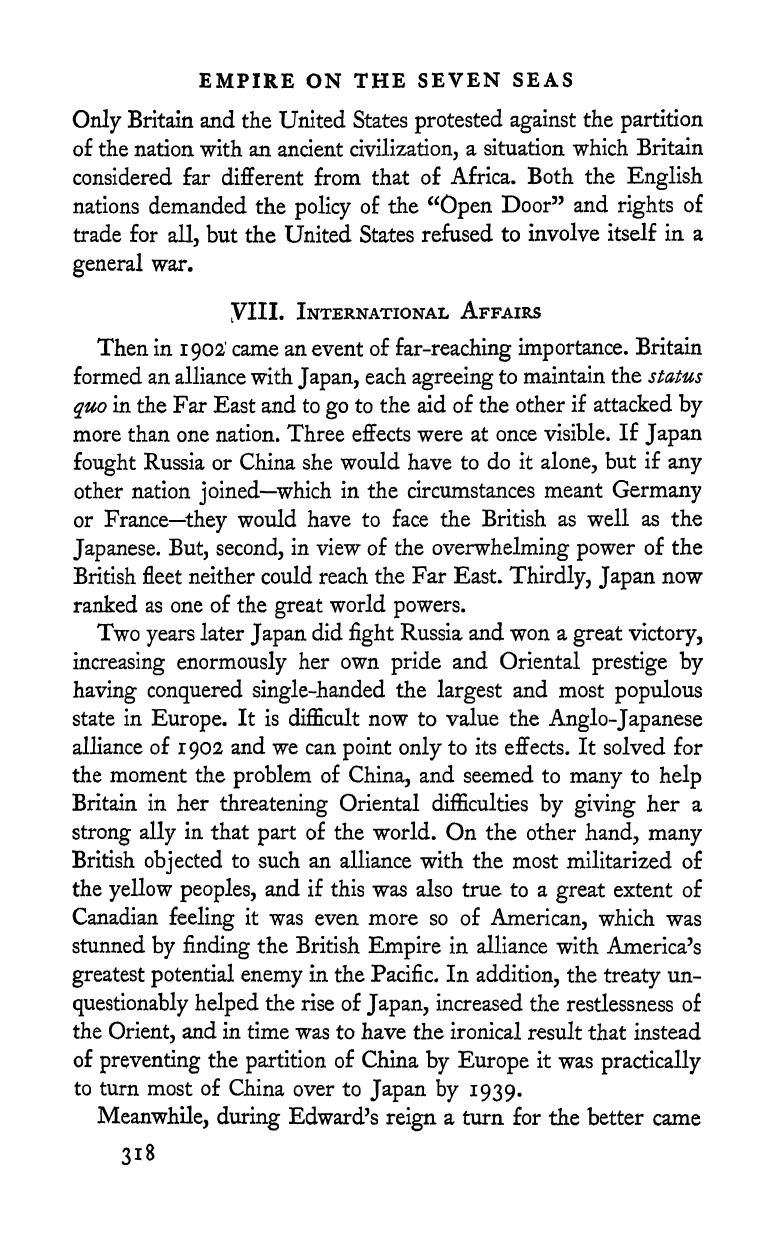
EMPIRE ON THE
SEVEN
SEAS
Only
Britain and
the United
States
protested
against
the
partition
of
the
nation
with an
ancient
civilization,
a situation
which
Britain
considered
far
different
from
that
of
Africa.
Both the
English
nations demanded
the
policy
of
the
"Open
Door"
and
rights
of
trade for
all,
but
the
United
States
refused
to
involve
itself in
a
general
war.
yill.
INTERNATIONAL
AFFAIRS
Then
in
1902'
came an
event
of
far-reaching
importance.
Britain
formed an alliance
with
Japan,
each
agreeing
to
maintain
the
status
quo
in
the
Far
East
and to
go
to
the
aid
of
the
other
if attacked
by
more
than
one nation. Three
effects were at
once visible.
If
Japan
fought
Russia or
China
she
would
have
to do
it
alone,
but if
any
other nation
joined
which
in
the
circumstances
meant
Germany
or
France
they
would
have
to face the British
as well as
the
Japanese.
But,
second,
in
view
of
the
overwhelming power
of the
British fleet neither
could
reach
the
Far
East.
Thirdly,
Japan
now
ranked as
one of
the
great
world
powers.
Two
years
later
Japan
did
fight
Russia and
won
a
great
victory,
increasing
enormously
her
own
pride
and
Oriental
prestige
by
having conquered
single-handed
the
largest
and
most
populous
state
in
Europe.
It
is difficult now to value
the
Anglo-Japanese
alliance of
1902
and
we
can
point
only
to
its
effects. It
solved
for
the moment the
problem
of
China,
and
seemed
to
many
to
help
Britain in
her
threatening
Oriental
difficulties
by
giving
her
a
strong
ally
in
that
part
of
the world.
On
the other
hand,
many
British
objected
to
such an
alliance
with
the
most militarized
of
the
yellow
peoples,
and if this
was
also
true
to
a
great
extent
of
Canadian
feeling
it
was even more
so
of
American,
which was
stunned
by
finding
the
British
Empire
in
alliance
with America's
greatest
potential
enemy
in
the
Pacific. In
addition,
the
treaty
un-
questionably helped
the
rise
of
Japan,
increased
the
restlessness
of
the
Orient,
and in
time was to have the
ironical
result
that
instead
of
preventing
the
partition
of
China
by
Europe
it
was
practically
to
turn most of
China over to
Japan
by
1939.
Meanwhile,
during
Edward's
reign
a turn
for
the
better
came
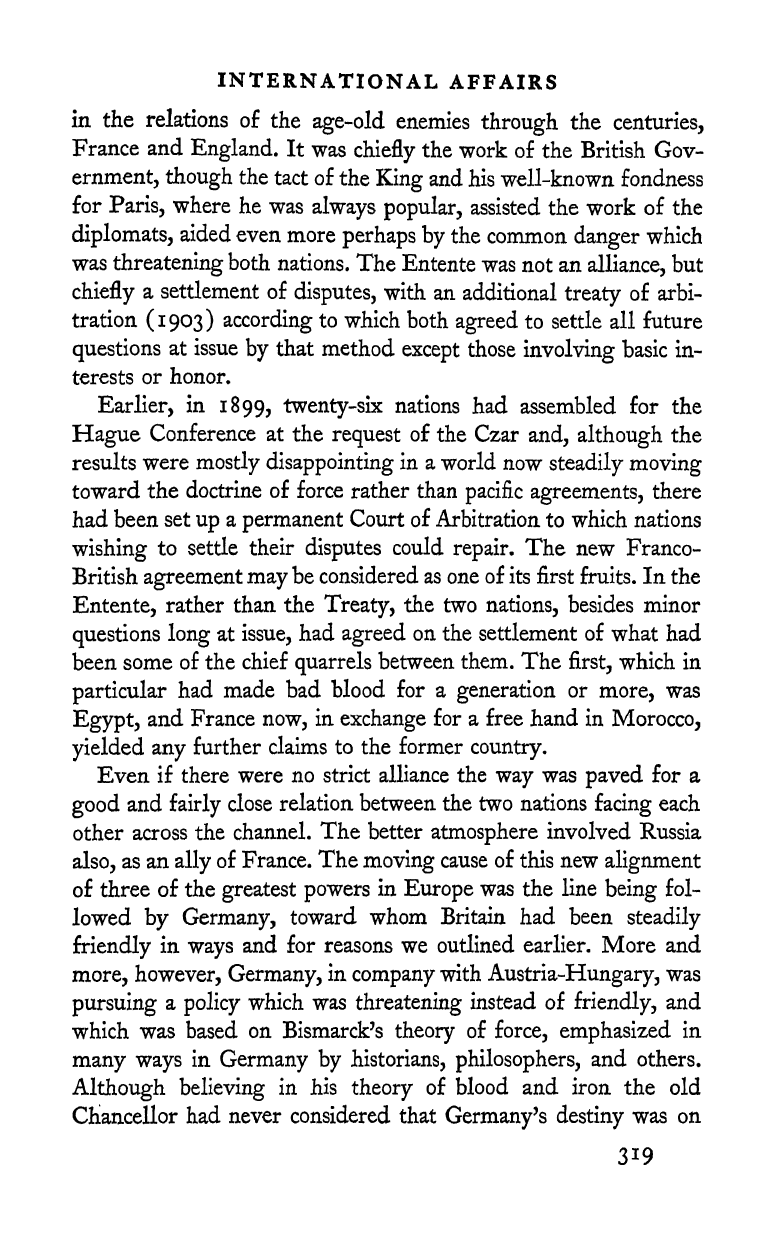
INTERNATIONAL
AFFAIRS
in
the
relations
of
the
age-old
enemies
through
the
centuries,
France
and
England.
It
was
chiefly
the
work
o
the British
Gov-
ernment,
though
the
tact
of
the
King
and
his well-known fondness
for
Paris,
where
he
was
always
popular,
assisted the
work
of
the
diplomats,
aided
even
more
perhaps by
the common
danger
which
was
threatening
both
nations.
The
Entente
was
not
an
alliance,
but
chiefly
a
settlement of
disputes,
with an
additional
treaty
of
arbi-
tration
(1903)
according
to which
both
agreed
to
settle all future
questions
at
issue
by
that
method
except
those
involving
basic in-
terests
or honor.
Earlier,
in
1899,
twenty-six
nations
had
assembled
for
the
Hague
Conference
at
the
request
of
the
Czar
and,
although
the
results
were
mostly
disappointing
in a
world
now
steadily
moving
toward
the
doctrine
of
force
rather
than
pacific
agreements,
there
had
been
set
up
a
permanent
Court
of
Arbitration to which nations
wishing
to settle
their
disputes
could
repair.
The
new
Franco-
British
agreement
may
be
considered as
one
of
its first
fruits.
In
the
Entente,
rather than the
Treaty,
the
two
nations,
besides minor
questions
long
at
issue,
had
agreed
on
the settlement
of
what
had
been
some
of
the
chief
quarrels
between
them. The
first,
which
in
particular
had
made bad
blood
for
a
generation
or
more,
was
Egypt,
and
France
now,
in
exchange
for a free
hand
in
Morocco,
yielded
any
further
claims
to
the
former
country.
Even
if
there
were
no strict
alliance
the
way
was
paved
for
a
good
and
fairly
close
relation
between
the
two
nations
facing
each
other
across
the channel.
The
better
atmosphere
involved Russia
also,
as
an
ally
of France.
The
moving
cause
of
this
new
alignment
of
three
of
the
greatest
powers
in
Europe
was
the
line
being
fol-
lowed
by
Germany,
toward whom
Britain
had
been
steadily
friendly
in
ways
and
for reasons we outlined
earlier.
More
and
more,
however,
Germany,
in
company
with
Austria-Hungary,
was
pursuing
a
policy
which was
threatening
instead of
friendly,
and
which
was based
on Bismarck's
theory
of
force,
emphasized
in
many ways
in
Germany by
historians,
philosophers,
and
others.
Although
believing
in his
theory
of blood and iron the old
Chancellor
had
never
considered
that
Germany's
destiny
was
on
319
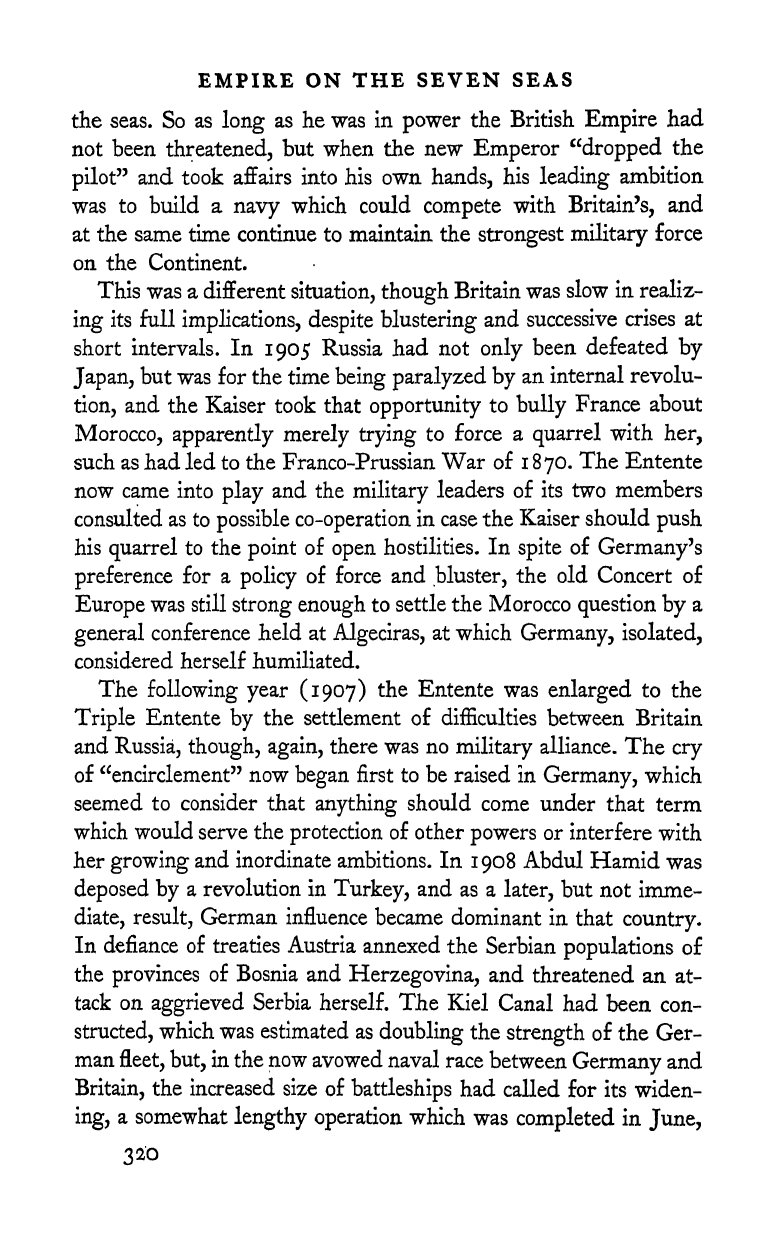
EMPIRE
ON THE SEVEN
SEAS
the
seas.
So
as
long
as he
was in
power
the
British
Empire
had
not been
threatened,
but when
the new
Emperor
"dropped
the
pilot"
and took
affairs into
his
own
hands,
his
leading
ambition
was
to build a
navy
which could
compete
with
Britain's,
and
at
the
same time
continue
to
maintain the
strongest
military
force
on the
Continent.
This
was
a
different
situation,
though
Britain
was
slow in realiz-
ing
its full
implications,
despite
blustering
and
successive
crises
at
short intervals.
In
1905
Russia had
not
only
been
defeated
by
Japan,
but was for
the time
being paralyzed
by
an
internal
revolu-
tion,
and
the Kaiser
took that
opportunity
to
bully
France
about
Morocco,
apparently merely trying
to force
a
quarrel
with
her,
such
as
had led
to
the Franco-Prussian
War of
1
870.
The
Entente
now came into
play
and
the
military
leaders
of
its
two members
consulted
as
to
possible
co-operation
in case
the Kaiser
should
push
his
quarrel
to the
point
of
open
hostilities.
In
spite
of
Germany's
preference
for
a
policy
of
force
and
bluster,
the old Concert of
Europe
was
still
strong enough
to
settle
the Morocco
question
by
a
general
conference held at
Algeciras,
at
which
Germany,
isolated,
considered
herself
humiliated.
The
following
year
(1907)
the Entente
was
enlarged
to
the
Triple
Entente
by
the settlement
of
difficulties
between
Britain
and
Russia,
though,
again,
there
was
no
military
alliance.
The
cry
of
"encirclement"
now
began
first
to be
raised in
Germany,
which
seemed
to
consider that
anything
should
come
under
that term
which
would
serve
the
protection
of other
powers
or
interfere
with
her
growing
and
inordinate
ambitions. In
1908
Abdul
Hamid
was
deposed
by
a revolution
in
Turkey,
and as
a
later,
but
not
imme-
diate,
result,
German influence
became
dominant in
that
country.
In
defiance
of
treaties
Austria annexed
the
Serbian
populations
of
the
provinces
of
Bosnia
and
Herzegovina,
and
threatened
an
at-
tack
on
aggrieved
Serbia
herself.
The
Kiel
Canal
had
been con-
structed,
which
was
estimated
as
doubling
the
strength
of
the
Ger-
man
fleet, but,
in
the
now
avowed naval
race
between
Germany
and
Britain,
the
increased size
of
battleships
had
called for
its
widen-
ing,
a
somewhat
lengthy operation
which
was
completed
in
June,
320
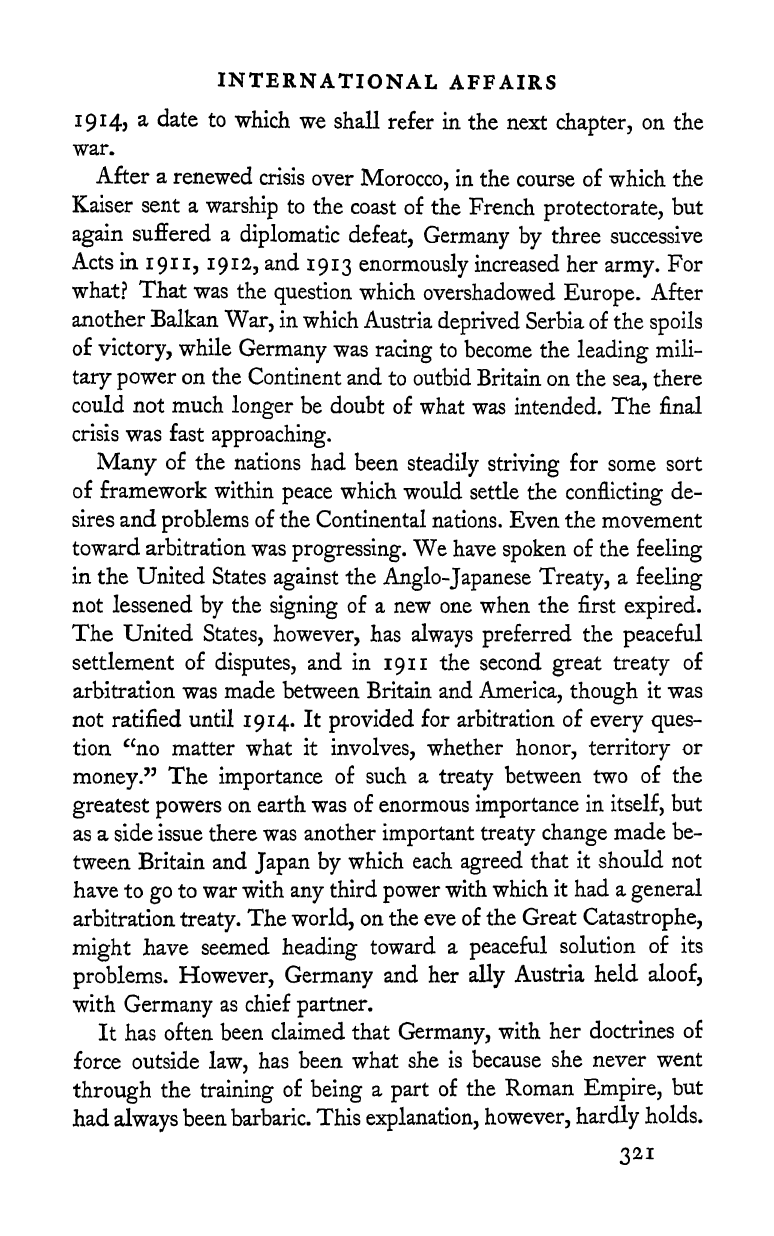
INTERNATIONAL
AFFAIRS
1914,
a
date
to
which
we
shall
refer
in
the next
chapter,
on
the
war.
After
a
renewed
crisis
over
Morocco,
in
the
course
of
which
the
Kaiser
sent
a
warship
to
the
coast
of
the French
protectorate,
but
again
suffered a
diplomatic
defeat,
Germany
by
three successive
Acts in
1911,
1912,
and
1913
enormously
increased her
army.
For
what?
That
was
the
question
which
overshadowed
Europe.
After
another Balkan
War,
in
which
Austria
deprived
Serbia of
the
spoils
of
victory,
while
Germany
was
racing
to
become the
leading
mili-
tary
power
on the
Continent and
to outbid
Britain
on
the
sea,
there
could
not
much
longer
be
doubt
of
what
was
intended.
The
final
crisis
was fast
approaching.
Many
of
the nations
had
been
steadily
striving
for
some
sort
of framework
within
peace
which
would settle
the
conflicting
de-
sires
and
problems
of
the
Continental
nations.
Even
the
movement
toward arbitration
was
progressing.
We
have
spoken
of the
feeling
in
the
United
States
against
the
Anglo-Japanese
Treaty,
a
feeling
not lessened
by
the
signing
of a
new one when
the
first
expired.
The United
States, however,
has
always
preferred
the
peaceful
settlement
of
disputes,
and
in
1911
the
second
great
treaty
of
arbitration was
made between
Britain and
America,
though
it
was
not
ratified
until
1914.
It
provided
for
arbitration
of
every
ques-
tion
"no
matter
what
it
involves,
whether
honor,
territory
or
money.
7'
The
importance
of such
a
treaty
between two
of
the
greatest powers
on
earth
was
of enormous
importance
in
itself,
but
as
a
side
issue
there was
another
important
treaty change
made be-
tween Britain
and
Japan
by
which
each
agreed
that
it
should
not
have
to
go
to
war
with
any
third
power
with which
it had
a
general
arbitration
treaty.
The
world,
on the
eve
of
the
Great
Catastrophe,
might
have
seemed
heading
toward
a
peaceful
solution
of its
problems.
However,
Germany
and
her
ally
Austria
held
aloof,
with
Germany
as
chief
partner.
It
has
often been
claimed that
Germany,
with
her doctrines
of
force
outside
law,
has
been
what
she is
because
she
never
went
through
the
training
of
being
a
part
of
the
Roman
Empire,
but
had
always
been
barbaric.
This
explanation,
however,
hardly
holds.
321
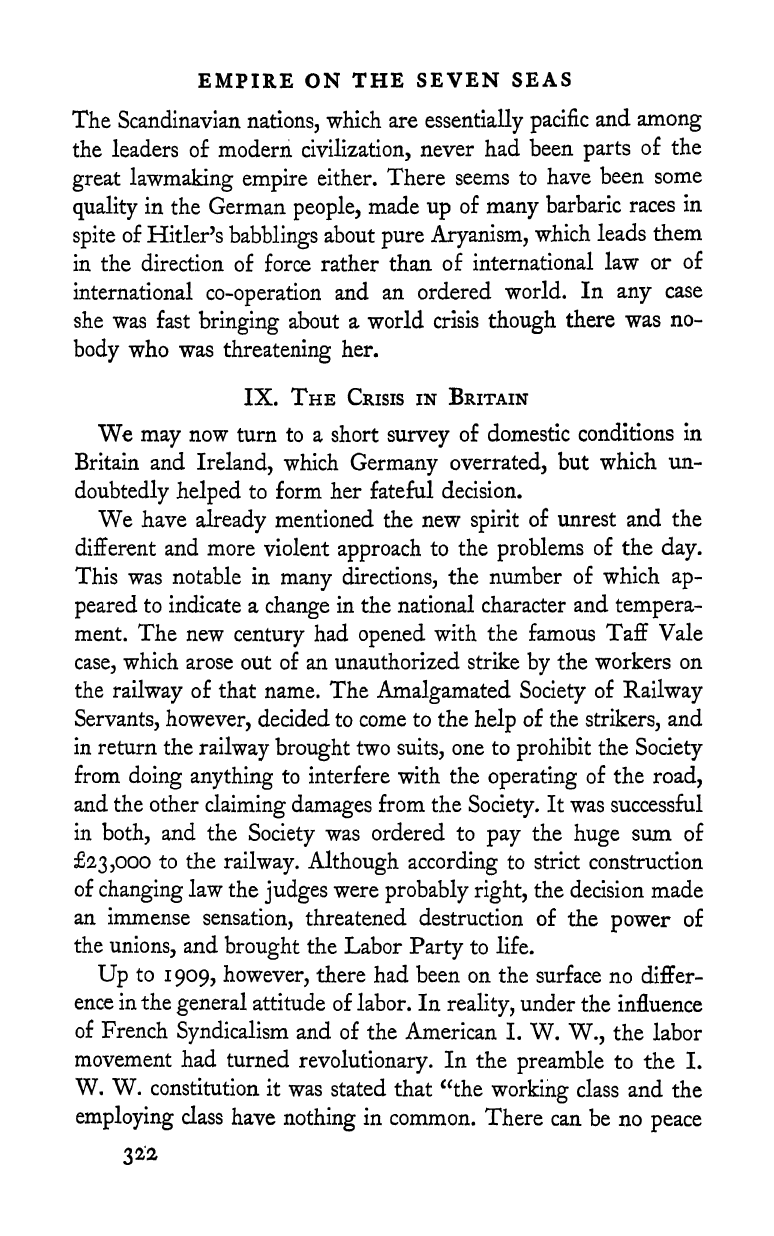
EMPIRE
ON
THE
SEVEN
SEAS
The
Scandinavian
nations,
which
are
essentially
pacific
and
among
the leaders of modern
civilization,
never
had
been
parts
of
the
great
lawmaking empire
either.
There
seems
to
have
been
some
quality
in
the German
people,
made
up
of
many
barbaric
races
in
spite
of
Hitler's
babblings
about
pure
Aryanism,
which
leads them
in the direction
of force rather
than
of
international
law
or
of
international
co-operation
and
an
ordered
world.
In
any
case
she
was fast
bringing
about
a
world
crisis
though
there
was
no-
body
who was
threatening
her.
IX. THE CRISIS
IN
BRITAIN
We
may
now
turn to
a short
survey
of domestic conditions
in
Britain and
Ireland,
which
Germany
overrated,
but
which
un-
doubtedly helped
to form her fateful
decision.
We
have
already
mentioned
the
new
spirit
of
unrest and
the
different and more
violent
approach
to
the
problems
of
the
day.
This was
notable
in
many
directions,
the
number of which
ap-
peared
to indicate
a
change
in
the
national
character
and
tempera-
ment. The
new
century
had
opened
with
the
famous
Taff
Vale
case,
which arose
out of an unauthorized
strike
by
the workers
on
the
railway
of
that
name. The
Amalgamated
Society
of
Railway
Servants,
however,
decided
to
come
to
the
help
of the
strikers,
and
in
return the
railway brought
two
suits,
one
to
prohibit
the
Society
from
doing
anything
to
interfere
with
the
operating
of the
road,
and the other
claiming
damages
from
the
Society.
It was
successful
in
both,
and
the
Society
was
ordered
to
pay
the
huge
sum
of
23,000
to the
railway.
Although
according
to strict
construction
of
changing
law
the
judges
were
probably
right,
the decision
made
an
immense
sensation,
threatened
destruction of
the
power
of
the
unions,
and
brought
the Labor
Party
to
life.
Up
to
1909,
however,
there
had
been
on the
surface no
differ-
ence
in the
general
attitude
of
labor.
In
reality,
under
the
influence
of
French
Syndicalism
and
of
the American
I.
W.
W.,
the
labor
movement
had
turned
revolutionary.
In
the
preamble
to the
I.
W. W.
constitution it
was
stated that
"the
working
class
and
the
employing
class
have
nothing
in
common.
There can
be
no
peace
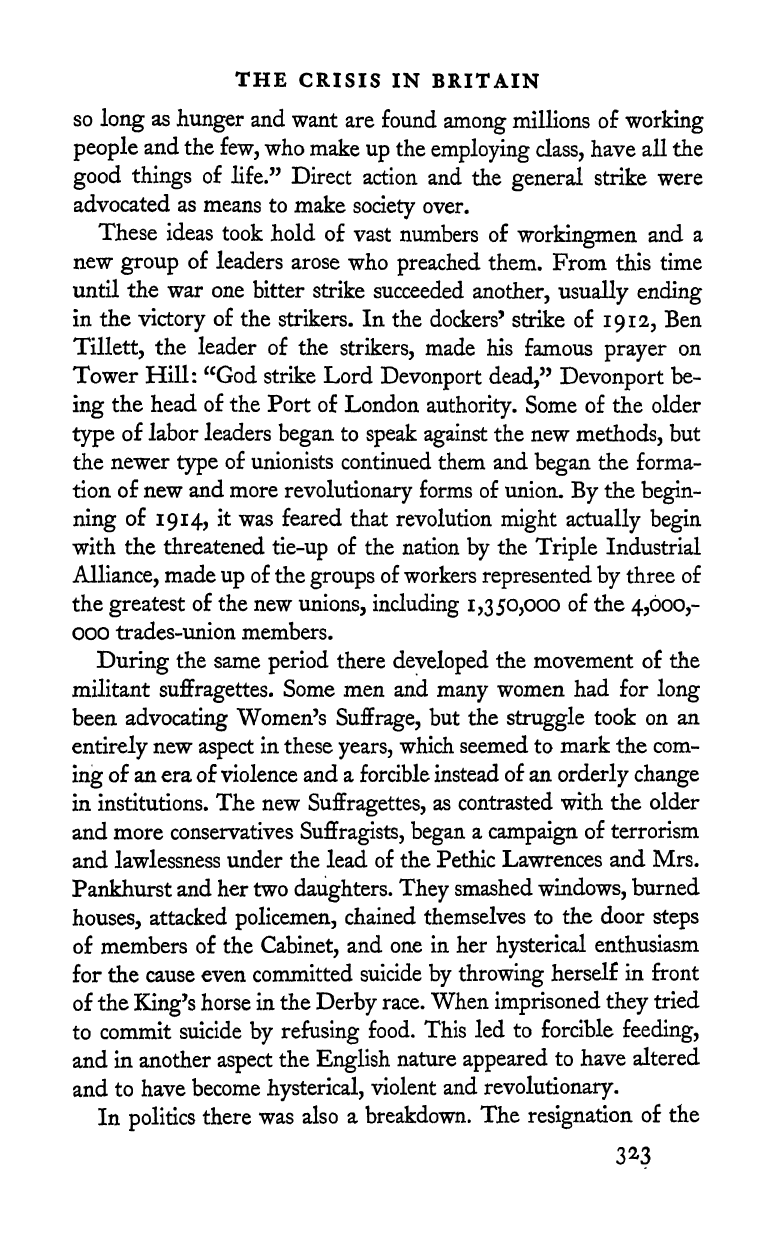
THE
CRISIS
IN
BRITAIN
so
long
as
hunger
and
want
are
found
among
millions of
working
people
and
the
few,
who
make
up
the
employing
class,
have
all the
good
things
of
life."
Direct
action and
the
general
strike
were
advocated
as
means to
make
society
over.
These ideas
took
hold
of
vast
numbers of
workingmen
and
a
new
group
of
leaders
arose
who
preached
them. From this
time
until
the war
one
bitter
strike
succeeded
another,
usually
ending
in
the
victory
of
the
strikers.
In
the dockers'
strike of
1912,
Ben
Tillett,
the leader of
the
strikers,
made
his
famous
prayer
on
Tower Hill:
"God
strike
Lord
Devonport
dead,"
Devonport
be-
ing
the head
of
the
Port of
London
authority.
Some
of
the older
type
of
labor leaders
began
to
speak
against
the
new
methods,
but
the
newer
type
of
unionists
continued
them and
began
the forma-
tion
of new
and
more
revolutionary
forms
of
union.
By
the
begin-
ning
of
1914,
it
was
feared
that revolution
might
actually
begin
with the
threatened
tie-up
of
the nation
by
the
Triple
Industrial
Alliance,
made
up
of
the
groups
of
workers
represented by
three
of
the
greatest
of
the
new
unions,
including
1,350,000
of
the
4,600,-
ooo
trades-union
members.
During
the
same
period
there
developed
the
movement of
the
militant
suffragettes.
Some
men
and
many
women had for
long
been
advocating
Women's
Suffrage,
but
the
struggle
took on
an
entirely
new
aspect
in
these
years,
which
seemed
to
mark
the
com-
ing
of
an
era
of
violence and
a
forcible
instead
of an
orderly
change
in institutions.
The new
Suffragettes,
as contrasted with
the
older
and more conservatives
Suffragists, began
a
campaign
of
terrorism
and
lawlessness
under the
lead of
the
Pethic
Lawrences
and Mrs.
Pankhurst
and her
two
daughters.
They
smashed
windows,
burned
houses,
attacked
policemen,
chained
themselves
to
the
door
steps
of
members
of
the
Cabinet,
and
one
in
her
hysterical
enthusiasm
for the cause
even
committed
suicide
by
throwing
herself
in front
of
the
King's
horse
in
the
Derby
race.
When
imprisoned
they
tried
to commit
suicide
by
refusing
food.
This
led to forcible
feeding,
and in
another
aspect
the
English
nature
appeared
to have
altered
and
to
have
become
hysterical,
violent
and
revolutionary.
In
politics
there
was
also
a
breakdown. The
resignation
of
the
3*3
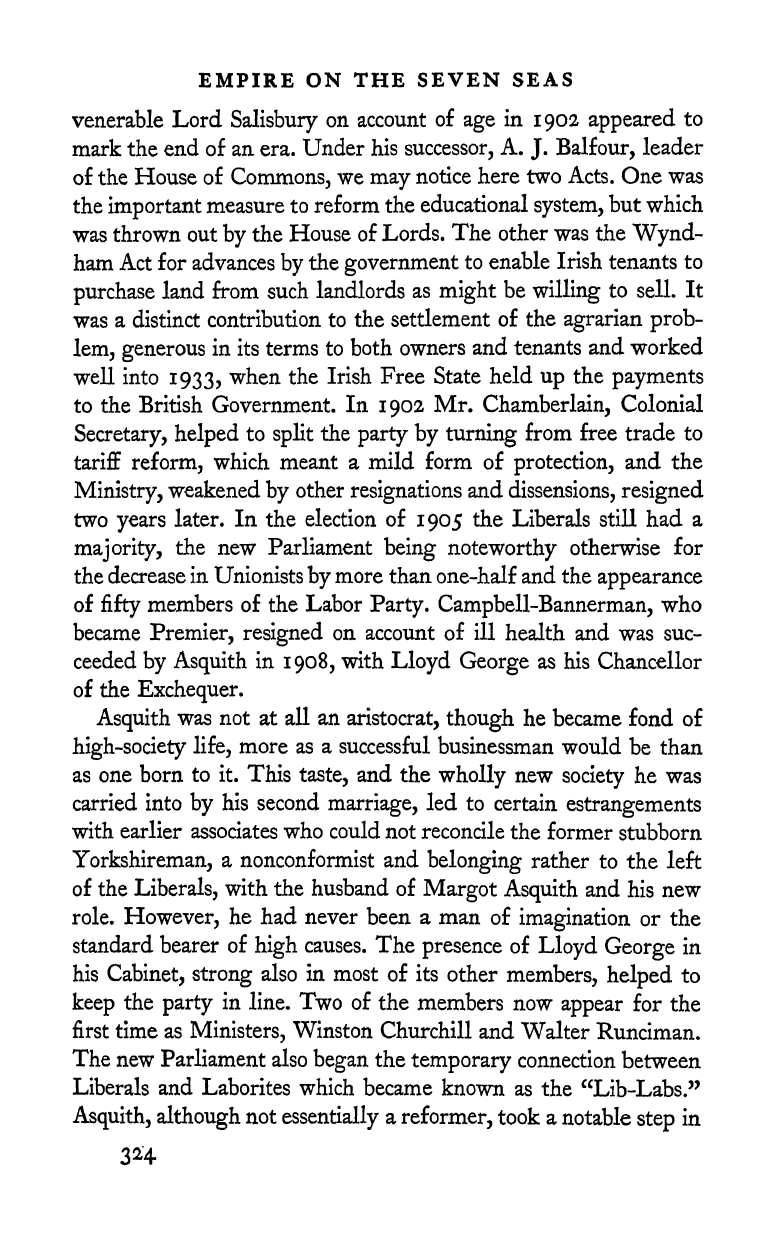
EMPIRE
ON THE
SEVEN SEAS
venerable
Lord
Salisbury
on account
of
age
in
1902
appeared
to
mark
the
end
of
an era.
Under his
successor,
A.
J.
Balf
our,
leader
of the
House
of
Commons,
we
may
notice here
two Acts.
One
was
the
important
measure
to
reform the
educational
system,
but
which
was
thrown out
by
the
House
of
Lords.
The other was
the
Wynd-
ham Act
for advances
by
the
government
to
enable Irish
tenants
to
purchase
land
from
such
landlords
as
might
be
willing
to
sell.
It
was
a
distinct
contribution
to
the
settlement of
the
agrarian
prob-
lem,
generous
in its terms to
both
owners
and tenants
and
worked
well
into
1933,
when
the
Irish
Free State
held
up
the
payments
to the British
Government.
In
1902
Mr.
Chamberlain,
Colonial
Secretary, helped
to
split
the
party
by
turning
from
free
trade
to
tariff
reform,
which
meant a mild
form of
protection,
and the
Ministry,
weakened
by
other
resignations
and
dissensions,
resigned
two
years
later. In
the
election
of
1905
the Liberals
still
had
a
majority,
the
new Parliament
being
noteworthy
otherwise
for
the
decrease
in
Unionists
by
more
than
one-half
and the
appearance
of
fifty
members
of the Labor
Party.
Campbell-Bannerman,
who
became
Premier,
resigned
on account
of
ill
health and was suc-
ceeded
by
Asquith
in
1908,
with
Lloyd
George
as his
Chancellor
of the
Exchequer.
Asquith
was
not at all
an
aristocrat,
though
he
became fond
of
high-society
life,
more as a
successful
businessman
would
be than
as
one
born
to
it.
This
taste,
and
the
wholly
new
society
he
was
carried
into
by
his
second
marriage,
led
to
certain
estrangements
with
earlier associates
who
could
not reconcile
the
former
stubborn
Yorkshireman,
a
nonconformist
and
belonging
rather
to
the
left
of the
Liberals,
with
the husband of
Margot
Asquith
and
his
new
role.
However,
he had never
been
a man
of
imagination
or the
standard
bearer
of
high
causes.
The
presence
of
Lloyd
George
in
his
Cabinet,
strong
also
in
most
of
its
other
members,
helped
to
keep
the
party
in
line. Two of
the
members
now
appear
for
the
first time as
Ministers,
Winston Churchill
and
Walter
Runciman.
The
new
Parliament also
began
the
temporary
connection
between
Liberals
and
Laborites
which
became
known as
the
"Lib-Labs."
Asquith, although
not
essentially
a
reformer,
took
a
notable
step
in
3*4
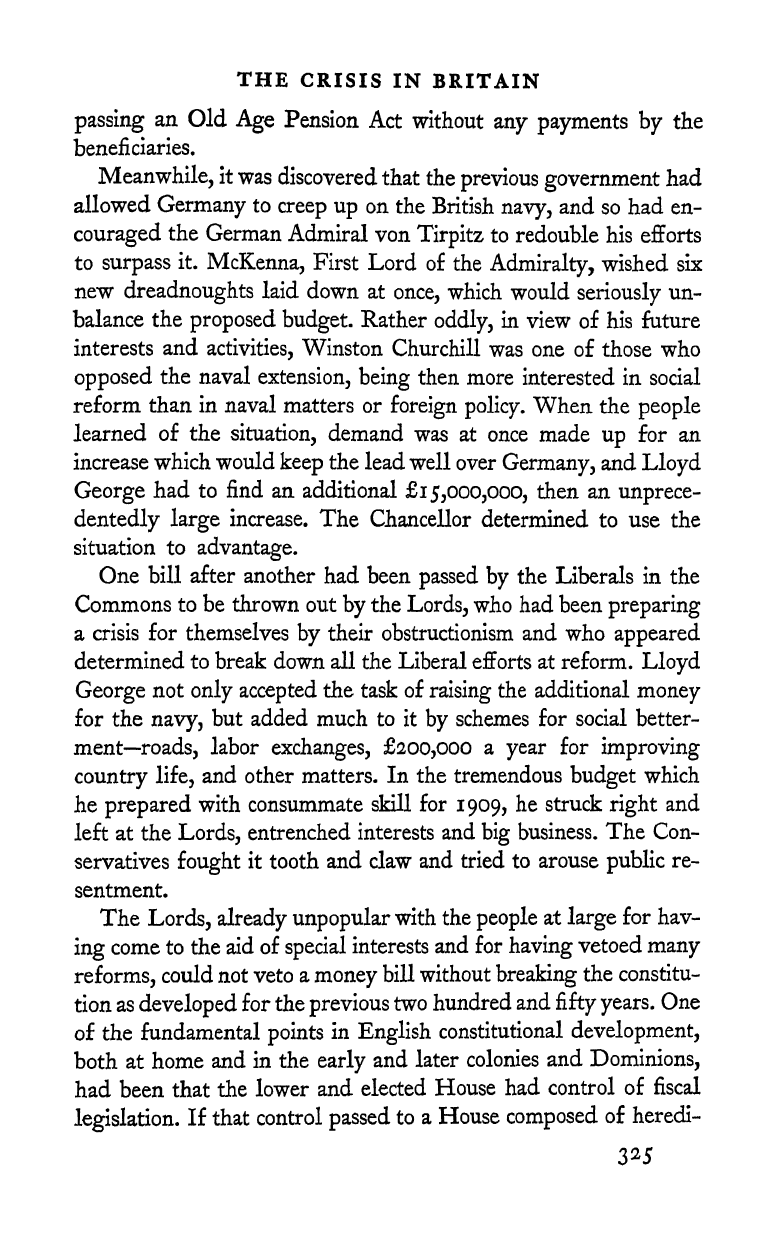
THE
CRISIS IN
BRITAIN
passing
an
Old
Age
Pension
Act
without
any
payments by
the
beneficiaries.
Meanwhile,
it
was
discovered
that
the
previous
government
had
allowed
Germany
to
creep
up
on
the
British
navy,
and
so
had en-
couraged
the
German
Admiral
von
Tirpitz
to
redouble his efforts
to
surpass
it.
McKenna,
First
Lord of
the
Admiralty,
wished six
new
dreadnoughts
laid
down
at
once,
which
would
seriously
un-
balance
the
proposed
budget.
Rather
oddly,
in
view
of
his future
interests
and
activities,
Winston
Churchill
was one of those who
opposed
the naval
extension,
being
then
more
interested
in social
reform
than in naval
matters
or
foreign
policy.
When the
people
learned
of
the
situation,
demand was at once
made
up
for an
increase
which would
keep
the
lead well
over
Germany,
and
Lloyd
George
had
to find an
additional
15,000,000,
then
an
unprece-
dentedly
large
increase.
The Chancellor
determined to
use
the
situation to
advantage.
One
bill
after another
had
been
passed by
the
Liberals in
the
Commons
to be thrown
out
by
the
Lords,
who had been
preparing
a crisis for themselves
by
their obstructionism
and
who
appeared
determined
to
break
down
all
the
Liberal efforts
at reform.
Lloyd
George
not
only
accepted
the
task
of
raising
the additional
money
for
the
navy,
but added
much
to
it
by
schemes
for social
better-
mentroads,
labor
exchanges,
200,000
a
year
for
improving
country
life,
and other matters.
In
the tremendous
budget
which
he
prepared
with
consummate
skill for
1909,
he
struck
right
and
left
at
the
Lords,
entrenched
interests
and
big
business.
The Con-
servatives
fought
it
tooth
and
claw
and
tried to
arouse
public
re-
sentment.
The
Lords,
already
unpopular
with
the
people
at
large
for
hav-
ing
come to the
aid
of
special
interests
and for
having
vetoed
many
reforms,
could not
veto
a
money
bill
without
breaking
the
constitu-
tion
as
developed
for the
previous
two
hundred
and
fifty
years.
One
of the
fundamental
points
in
English
constitutional
development,
both
at
home
and in
the
early
and
later
colonies
and
Dominions,
had
been
that
the
lower
and
elected
House
had
control
of
fiscal
legislation.
If that control
passed
to
a House
composed
of
heredi-
325
